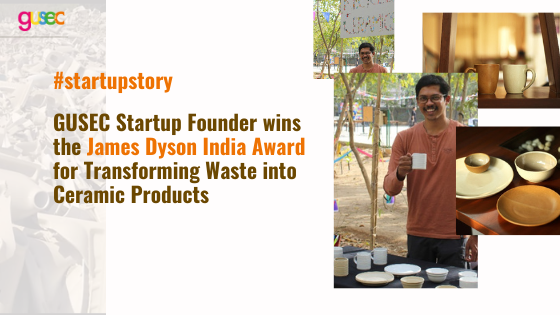GUSEC Startup Founder wins the James Dyson India Award for Transforming Waste into Ceramic Products

Art, Origami, & Maths
“Have you ever thought about Fevicol? It’s such a simple product, a bunch of polymers mixed with water filled in bottles, and it has endless utility. It helps people make products, aid them with art and craft, and comes useful in carpentry. I always wanted to make something universally useful, just like Fevicol.” Shashank mulls over.
I don’t know anybody who knows anybody who’s ever thought about Fevicol that deeply. But then, not everyone ends up bagging awards for their creative endeavours either. Shashank Nimkar won the James Dyson India Award of 2020 for his work with Earth Tatva, that uses ceramic waste to make new products, specifically ceramic tableware, manufactured through a zero-waste process and can even be recycled further. With Earth Tatva, Shashank aims to raise consciousness about how our smallest of choices lead to big changes in the world.
A master of creativity from the very beginning, Shashank progressed from DIY craft books to Origami in the 3rd grade. Later in school, his mother enrolled him in software classes that made him proficient with CorelDraw and Photoshop. Did he stop there?
Of course not. From helping all his friends make their SUPW (Socially Useful Productive Work) projects to trying out craft projects straight out of M.A.D, Shashank made CD cases, wax candles, among other things. “80% of my classroom was filled with the charts I voluntarily made which were illustrations about topics in the curriculum”. Shashank reminisces. Taking up gymnastics as early as the first grade, he soon progressed to athletics, relay races, lawn tennis, and represented his school at the district level in table tennis.
So, was there something Shashank couldn’t do? “Math. I couldn’t bring myself to be interested in math, no matter how hard I tried. This alienated me from my friends because they were all studying for their engineering entrances and I was preparing to go to design school”. He pursued his graduation in visual communication and design, and during his post-graduation, undertook a project in recycling ceramics that later led him to venture into entrepreneurship and founding Earth Tatva.
Founding Earth Tatva
Between his graduation and post-graduation, Shashank did a lot of design projects for the advertising industry, where he noticed the amount of material the organisers would use to make the set and dispose of all of it after the shoot was over. Nobody did anything about the waste because disposing it correctly or utilising it elsewhere would require additional time and resources, which they couldn’t spare. Constant exposures to instances of waste management led Shashank to consider it as a serious project during his Masters at NID, Ahmedabad.
“I always considered myself an outlier and was too self-driven to work for an organisation. I even started my own design label between my graduation and masters, so my consideration to turning my academic project into a venture wasn’t really my first step into entrepreneurship.” With Earth Tatva, Shashank set high standards for himself. He tells me how Japan uses 50% of their recycled waste in ceramic production, which was the benchmark that he set for himself, making things harder for himself. “I also realised that recycled material is pulverised, making it relatively expensive than the virgin material, which is mostly perceived as non-profitable; but isn’t necessarily true”.
Having set out on the path he set out for himself, Shashank approached studios in Ahmedabad who, getting to know about the problem he was addressing, were more than happy to help and let him borrow their moulds. Earth Tatva got incubated at GUSEC in May 2020 and is looking forward to avail support through government grants. Appraising the efforts of GUSEC during the lockdown, Shashank says that their sessions with Shri BV Jagadeesh gave him a lot of insights into the startup business.
All That Glitters…
Speaking of today’s culture of consumerism, Shashank gives me a deeper insight into his motives with Earth Tatva. “We see & buy flawless industrial products because that’s how we’ve been conditioned culturally in terms of our perception of beauty. We don’t realise that at the back end of every industry, for every perfectly manufactured product, there are ten discarded defective pieces.” Drawing an interesting parallel, he observes how people want to buy spotless, brightly saturated fruits, even though they might not be nutritious inside. He continues, “Just like the quirks we perceive as flaws make human beings special, defects in the product may look like defects, but they also give them their own unique character.”
Shashank’s story gives us a lot of lessons, few of which may be: it’s okay if you’re not good at maths or if you’re not the brightest bulb in the class. Shashank says that if you have an itch, continue scratching it. Try not to look for validation too soon, and do not be afraid to swim against the tide. Most importantly, Shashank implores us to realise that all our actions have consequences, and we can always make better choices instead of looking the other way.
Earth Tatva is now collecting pre-launch registrations on its website. Click here to know more.
Want to know what we’re up to? Subscribe to our newsletter.
